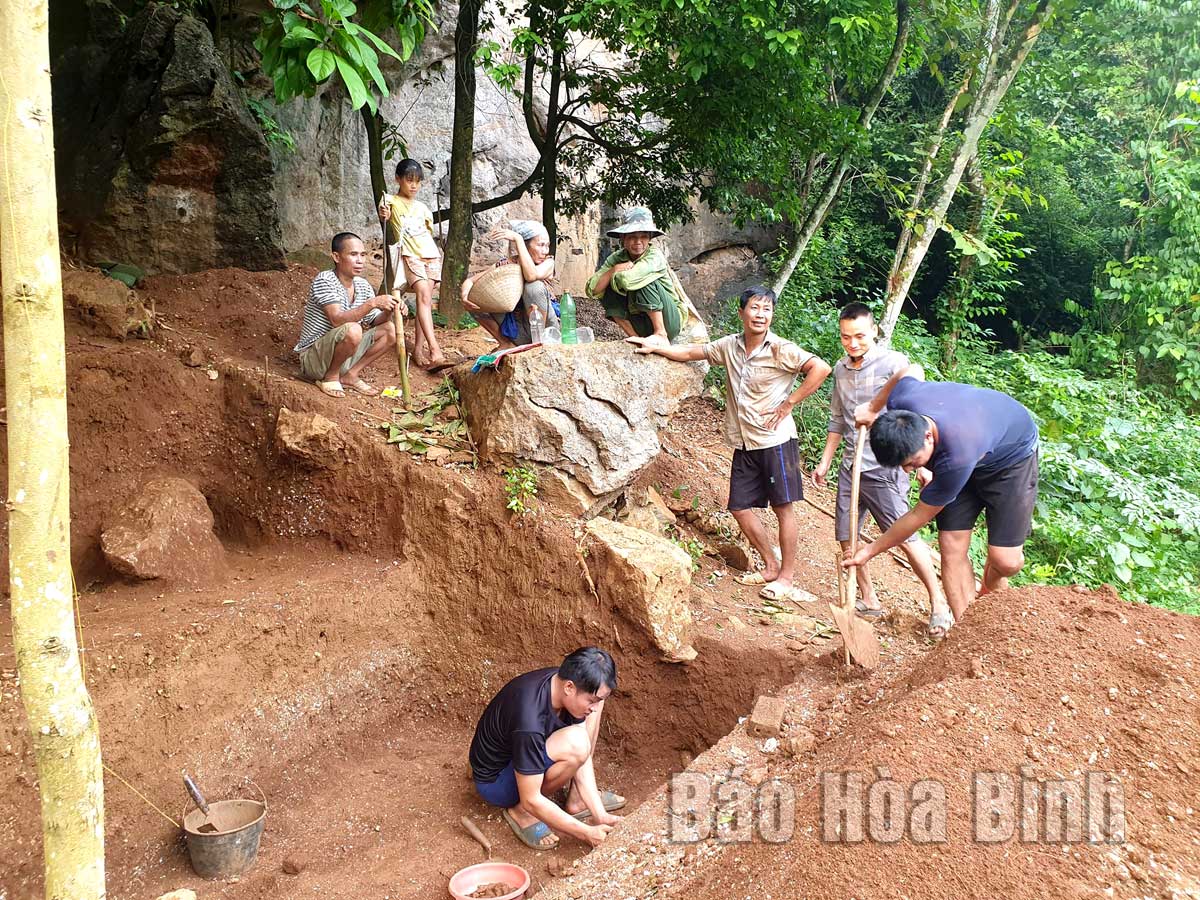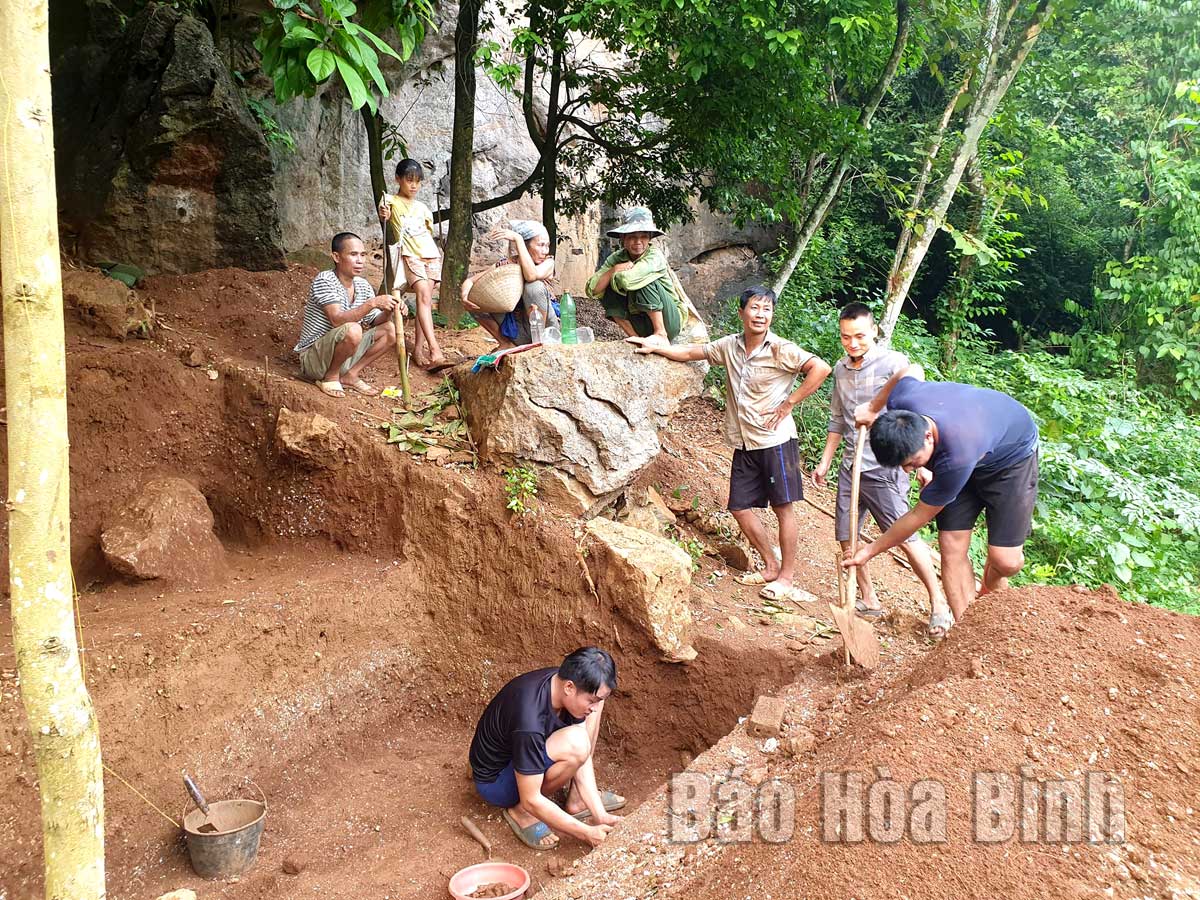
(HBO) – Hoa Binh province is currently home to more than 120 relic sites of the Hoa Binh Civilisation. There haven’t been any relic sites of this civilisation’s early period (about over 30,000 - 20,000 years ago) found in the province. While some sites date back to the middle period (over 20,000 - over 10,000 years ago), the majority belong to the late period of the civilisation (over 10,000 - 7,000 years ago).
An excavation team works at the Vanh Village stone
shelter relic site in Yen Phu commune of Lac Son district in 2022.
Relic sites of Hoa
Binh Civilisation’s middle period
The Trai Hamlet Cave relic site, located in Trai
hamlet of Tan Lap commune (Lac Son district), was discovered in 1980. The
Vietnam Institute of Archaeology carried out excavations there in May 1981 and
August 1982 and concluded that this is a typical relic site of the Hoa Binh
Civilisation. In 1997, this place was recognised as a national historical and
cultural relic site.
The Khoai Cave relic site in Khoai Mountain in
Sun hamlet of Xam Khoe commune (Mai Chau district) dates back to 17,000 -
11,000 years ago. It was listed as a national historical and cultural relic
site in 1997.
Dating back to 17,000 - 8,000 years ago, the
Vanh Village stone shelter in Trang Mountain of Vanh hamlet, Yen Phu commune
(Lac Son district), was found by French archaeologist M. Colani in 1929. Thanks
to its precious historical and scientific values, it earned the national
importance status in 2004.
Relic sites of Hoa
Binh Civilisation’s late period
Exploring Muoi Cave in Bua Ben Mountain of Man
Duc township (Tan Lac district), archaeologists have unearthed more than 900
objects and two graves there. The site, dating back to 10,000 - 7,000 years
ago, contains a wide range of vestiges typical for the late period of the Hoa
Binh Civilisation. It was recognised as a historical and cultural relic site in
1995.
Meanwhile, the Cho Cave relic site in Hui hamlet
of Cao Son commune (Luong Son district) was first excavated by M. Colani in
1926. Research findings revealed that it dates back about 10,000 years and was
a long-term living place of prehistoric humans. The cave was named a historical
and cultural relic site of national importance in 2000.
At Bung Cave in Suoi Hoa commune (Tan Lac
district), working tools and animal and plant traces found there indicate that
the site dates back over 10,000 years. It earned the national importance
recognition in 2003.
The Tam Cave relic site, located in Rong Tam
hamlet of Lam Son commune (Luong Son district), contains diverse work tools
typical for techniques used in the Hoa Binh Civilisation. Dating back to less
than 10,000 years ago, it was recognised as a national historical and cultural
relic site in 2000.
Dong Thot Cave in Ba Hang Doi township (Lac Thuy
district), dating back to about 10,000 - 7,000 years ago, was recognised as a
national historical and cultural relic site in 2001.
According to the Hoa Binh provincial Museum,
only 12 archaeological relic sites in the localities have been listed as
historical and cultural sites of national importance, including 10 belonging to
the Hoa Binh Civilisation. There remain a large number of relics that haven’t
studied, and it is necessary to have a long-term plan for the civilisation
research./.
With an increasingly vibrant and widespread emulation movement aimed at building cultured residential areas and cultured families, Yen Thuy District has been making steady progress toward improving both the material and spiritual well-being of its people, while fostering a civilized, prosperous, beautiful, and progressive community.
Once lacking recreational spaces and community facilities, Residential Group 2 in Quynh Lam Ward (Hoa Binh City) has recently received attention for the construction of a new, spacious, and fully equipped cultural house. The project followed the model of state support combined with public contributions in both labor and funding.
The "All people unite to build cultural life" movement, which has been effectively integrated with Kim Boi district’s socio-economic development goals, is fostering a lively spirit of emulation across local residential areas, hamlets, villages, public agencies, and enterprises. In addition, through the initiative, traditional cultural values are being preserved and promoted, while community solidarity and mutual support in poverty reduction and economic development are being strengthened.
A working delegation of the Hoa Binh provincial People’s Committee led by its Permanent Vice Chairman Nguyen Van Toan on June 11 inspected the progress of a project to build the Mo Muong Cultural Heritage Conservation Space linked to tourism services in Hop Phong commune, Cao Phong district.
Born and growing in the heroic land of Muong Dong, Dinh Thi Kieu Dung, a resident in Bo town of Kim Boi district, in her childhood was nurtured by the sweet lullabies of her grandmother and mother. These melodies deeply imprinted on her soul, becoming an inseparable part of her love for her ethnic group's culture. For over 20 years, this love for her hometown has driven Dung to research, collect, and pass down the cultural values of the Muong people to future generations.
In the final days of May, the Ethnic Art Troupe of Hoa Binh Province organized performances to serve the people in remote, mountainous, and particularly disadvantaged areas within the province. These were not just ordinary artistic shows, but they were the meaningful journeys aimed at spreading cultural values, enhancing the spiritual life of the people and contributing to the preservation of ethnic minority cultural identities.



